| Life on the canal -
The Story of Joe Hollingshead |
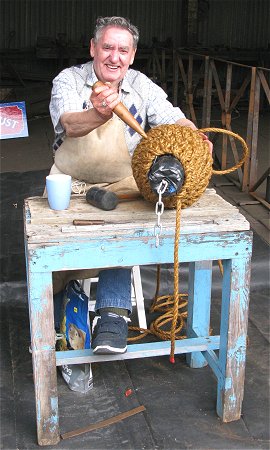
Joe
Hollingshead at the Black Country
Living Museum. |
Joe is the last in a long line of
canal boatmen, his family lived and worked on the canals
for several generations. He was born at Fradley
Junction, just outside Lichfield, on the Trent and
Mersey Canal, in a boat called the Victory.
When he was about to be born, they
moored the boat at the side of the canal near a pub, so
that the local midwife could easily get there. After the
birth, Joe and his mother stayed in a cottage with
friends, while his father and grandfather took a load of
flour to Nottingham.
In those days you had to keep
working to earn enough money to survive. Joe and his
mother soon rejoined the boat, which picked them up
during the return journey from Nottingham to Birmingham.
Joe grew up on the boat with his
parents, Joe and Harriet; two brothers, Albert and
Henry; and three sisters, Joan, Phoebe and Elizabeth. It
would have been a tight squeeze in the small cabin at
the back of their boat. There was little space and so
you had to sleep where you could. The family had few
possessions because there was nowhere to put them. |
|
Some of the lock keepers would help
the boating families with food. They caught rabbits and
sold them to the people on the boats, and also gave them
potatoes.
Drinking water was carried in a
couple of cans on the cabin roof, which could be filled
from the taps that were to be found every few miles or
so along the canal. Joe’s main job was helping his
mother with the canal locks.
He greatly enjoyed his childhood,
playing games with the other children who lived on the
canal, such as hide and seek, kiss chase, and kick the
can. They would sometimes tie a piece of rope to a tree
and swing on it.
Although the children were supposed
to go to school, this was impossible because the family
was always on the move, carrying loads from one place to
another. Joe only went to school for an hour at a time
at schools in Manchester, Birmingham and Wolverhampton.
If he was late leaving school he would worry, and run
down to the canal in case his parents had left without
him. |

Joe's grandparents. Courtesy of Joe
Hollingshead. |
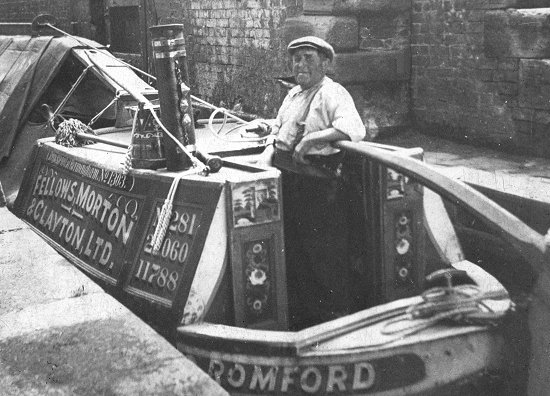 |
Joe's grandfather on his boat.
Courtesy of Joe Hollingshead. |
| Joe's father and
his boat.
Courtesy of Joe Hollingshead. |
|
 |
|

Joe on 'Victory', the boat on
which he was born. Courtesy of Joe Hollingshead. |
Joe’s dad eventually got a ‘butty’
boat, which was towed behind his powered boat. This gave
the family more room.
Money must have been in short
supply considering that they only earned 10 shillings
for carrying a full load of 20 tons from Manchester to
Wolverhampton. They also did small jobs for other people
to earn extra money, such as helping them through locks,
or steering a butty. They also made and sold rugs and
fenders.
At the age of 15 his father decided
that Joe had to start work because he had been kept for
long enough. He began working for British Waterways as a
mate, for his father who was a captain. When he reached
18, he persuaded British Waterways to let him captain
his own boat.
After a month’s trial he took over
a steel hulled boat called ‘Acacia’. His first job was
taking a load of flour from Ellesmere Port to
Wolverhampton. |
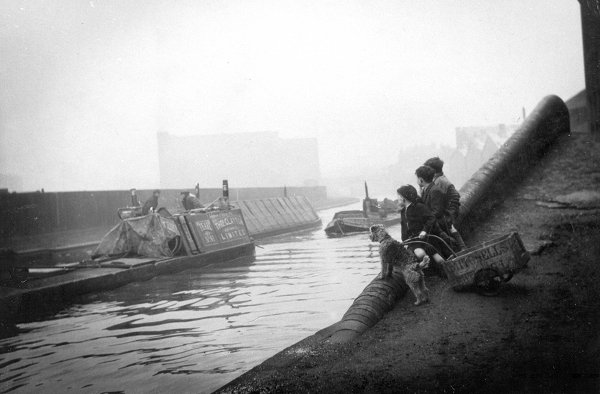
Watching the boats go by. On the BCN main
line. Courtesy of Joe Hollingshead.
|
Three years later, Joe met his
wife-to-be, Hilda. She also grew-up on the canal, but
sadly her mother and father died while she was young,
and so she had gone to live in Wales with her brother.
The life in Wales didn’t suit her
and so she returned to Wolverhampton and lived on a boat
with her uncle George, and Aunt Hilda.
Unfortunately her uncle George’s
working life ended after he had a heart attack at Broad
Street. As a result the family left the canal and moved
into a house in St. Anne’s Road, Fordhouses, and Hilda
got a job working for IMI Marston.
One of Joe’s regular jobs was to
carry chocolate from Cadbury’s in Bourneville. He was
always given free chocolate bars for himself, and he met
Hilda when she asked him for a bar of chocolate. At the
time Hilda was still living on the canal, and they used
to arrange to meet under the old Broad Street canal
bridge when their boats were in the area. |
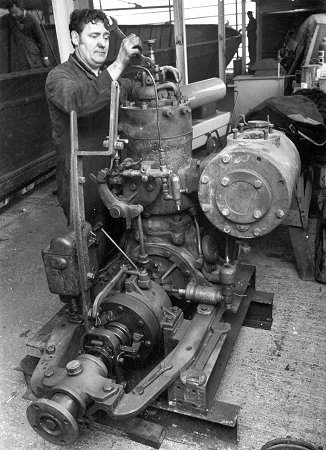
Joe, repairing
a Bollinder engine. Courtesy of Joe Hollingshead. |
|
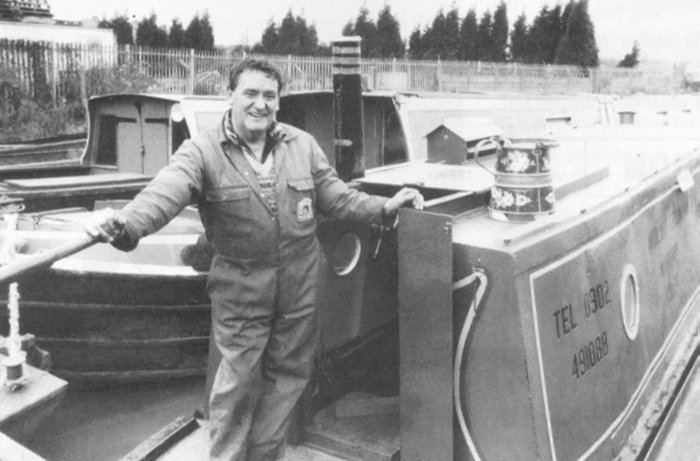
Joe at the repair yard at
Bradley in the 1990s. |
|
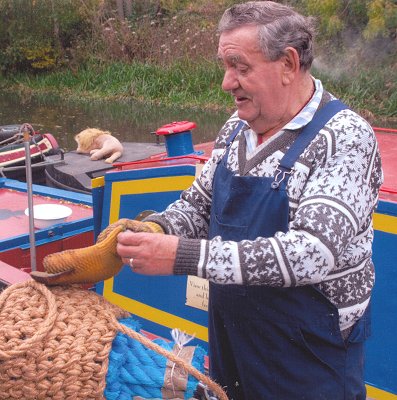
Fender making. Courtesy of Joe
Hollingshead. |
The winter of 1963 was particularly bad. One day Joe
went to collect a load of fittings from Stewarts and
Lloyds at Halesowen. He had to stay overnight and slept
in the factory where it was warm.
The next day he went through the Netherton Tunnel on
his way back to Wolverhampton and met an ice boat, which
eased his journey. He later met another at Tipton and
got a tow back to Wolverhampton. On his return he moored
at Broad Street and was stuck there for 13 weeks on the
frozen canal.
Joe and Hilda decided to get married in 1963. She
used to worry about him, particularly when he was late
returning from a journey. They would need a reliable
income after their marriage, and so she arranged for him
to see about a job at IMI Marston, where she worked. |
|
They were married on 1st June,
1963, and Joe started work at Marstons, where he stayed
for 26 years, before going to work for British
Waterways. At Marstons he learned to write, thanks to a
caring foreman who spent time teaching him in the
evenings.
Sadly Hilda died in November 2006.
Joe has two children and three grandchildren, and now
gives demonstrations of fender making at various canal
events in the area. |
 |
Return to the Canals
and Industry Menu |
|